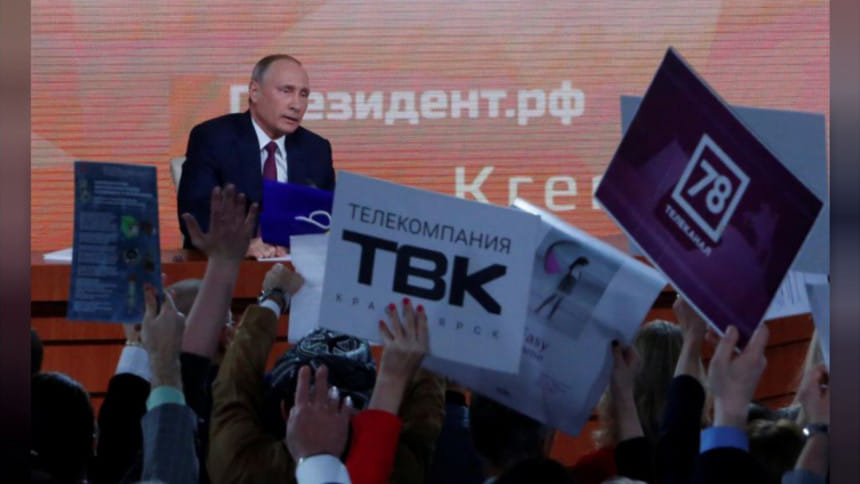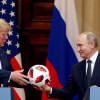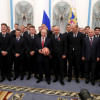Putin plans to be independent candidate

Russian President Vladimir Putin kicked off an annual press conference Thursday, his first major public appearance since announcing he would seek a new six-year term in March 2018 elections.
The marathon event has in the past lasted up to almost five hours and this year more than 1,600 journalists were accredited.
Proceedings began with a question from a Moscow radio station on the reasons the president was seeking re-election, after the long-expected confirmation of his candidacy last week.
"To improve quality of life for Russians," said Putin, who has been in power since 1999 and could become the country's longest-serving leader since Joseph Stalin if he wins a fourth term.
Putin said he would stand for election as an independent candidate rather than with the backing of his traditional party, United Russia, despite "counting on the support of the political forces that share my point of view about the development of the country".
A journalist asked about the state of the opposition in polls in which Putin will face only nominal competition and is all but certain to cruise to victory.
According to a survey published by independent pollster Levada on Wednesday, 75 percent of Russians would be prepared to vote for Putin in March, despite having yet to hear any specific campaign pledges.
"Is it up to me to form the opposition myself?" Putin replied. "I think in politics, as in the economy, there should be competition. I will strive for this."
One of these opponents is Ksenia Sobchak, a former socialite turned liberal TV presenter who many suspect is running as Kremlin "spoiler" candidate to split the opposition and boost interest in the polls.
Sobchak, whose father was Putin's political mentor and who is rumoured to be the president's goddaughter, was at Thursday's event as a journalist for opposition television channel Dozhd and was expected to be allowed to ask a question.
Opposition leader Alexei Navalny is officially barred from appearing on the ballot paper because of a criminal conviction, which he says was politically motivated.
Putin's main challenge will be to convince Russians to vote at all in an election that he is widely expected to win. According to Levada, only 28 percent of Russians said they were certain to vote in March.
- Carnival atmosphere -
As in previous years, there was something of a carnival atmosphere in the press conference hall with journalists holding signs to attract the president’s attention and one reporter even dressed as the Russian equivalent of Father Christmas, an AFP correspondent said.
Signs offered an indication of the sort of question the reporters would ask if given the floor by the president and slogans included "children," "agriculture," "Krasnoyarsk is choking," and "spiritual foundations".
Placards larger than A3 would be banned from the hall, the Kremlin press service said.
Presidential spokesman Dmitry Peskov said Putin spent all of the previous day preparing for his 13th such press conference.
The president typically answers questions on a broad range of topics -- from foreign policy to the state of provincial roads to his private life -- and receives televised requests from the far corners of Russia.
On Thursday he said it was "obvious" that the Russian economy was growing and said grain exports had been "brilliant".
"We have reached a stage of confident development," he said.
A crash in oil prices in 2014, along with international sanctions imposed over Moscow's actions in Ukraine, helped push Russia into its longest recession since the Kremlin strongman came to power.
The country's economy returned to growth only at the end of last year with a tepid 0.3 percent expansion.

 For all latest news, follow The Daily Star's Google News channel.
For all latest news, follow The Daily Star's Google News channel. 








Comments